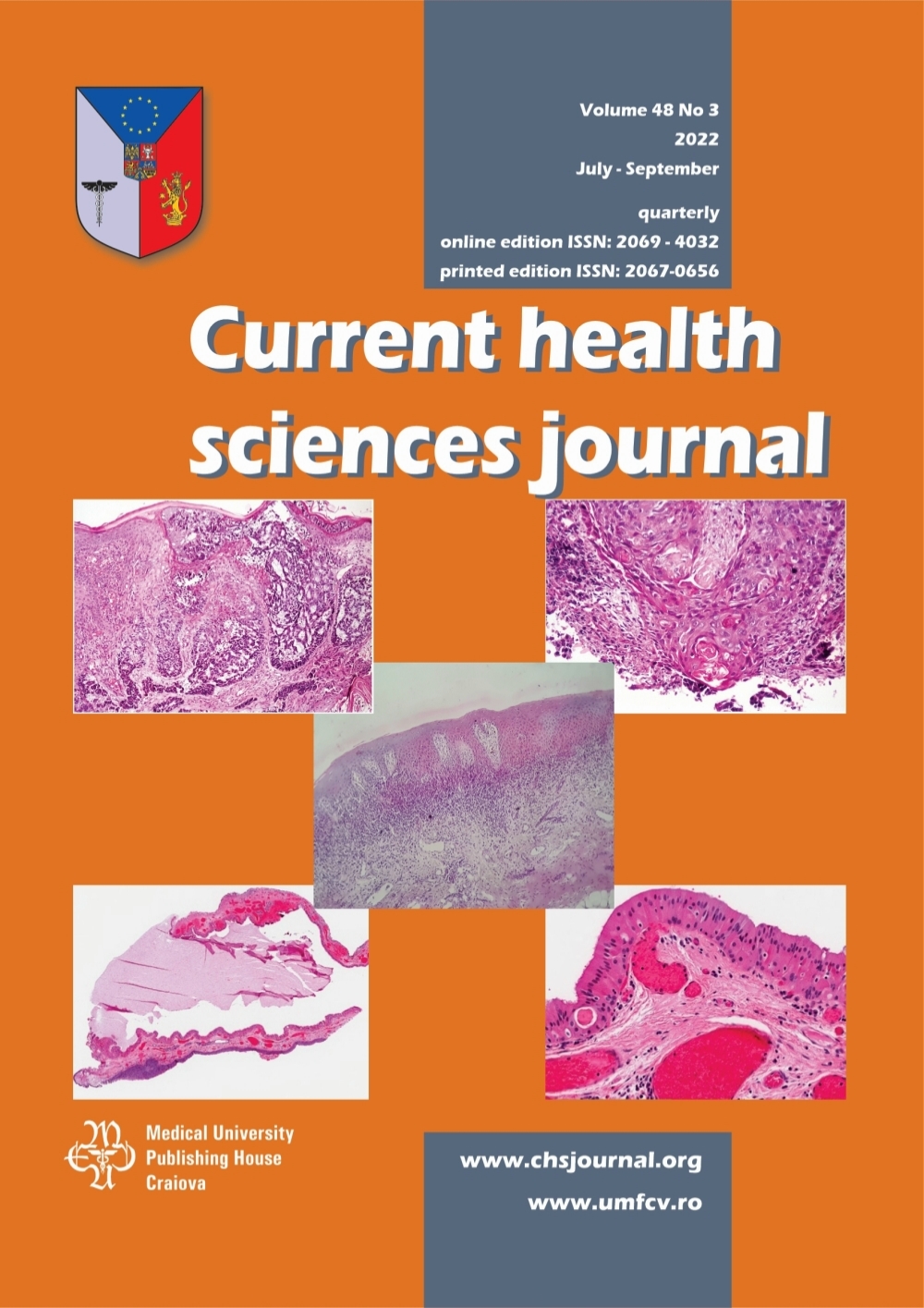Curr Health Sci J, vol. 48, no. 3, 2022
Metabolic Alterations in Acute Cerebral Ischemia
[Original Paper]
A.M. Poenaru (1), M. Ionescu(2), C.V. Albu(3), I. Rogoveanu (4), T.A. Balseanu(5)
(1)Doctoral School, University of Medicine and Pharmacy of Craiova, Romania,
(2)Department of Medical Informatics and Biostatistics, Faculty of Dental Medicine, University of Medicine and Pharmacy of Craiova, Romania,
(3)Department of Neurology, Faculty of Medicine, University of Medicine and Pharmacy of Craiova, Romania,
(4)Department of Gastroenterology, Faculty of Medicine, University of Medicine and Pharmacy of Craiova, Romania,
(5)Department of Functional Sciences, Faculty of Medicine, University of Medicine and Pharmacy of Craiova, Romania
Abstract:
Cerebral ischemia is a major health problem worldwide, that affects millions of people, leaving a major percentage of them with major disabilities, therefore becoming one of the most resource consuming pathology. Beside the blockage of blood supply of the brain that leads to loss of cellular function and neuronal necrosis, metabolic processes are modified in the whole body through mechanisms that are not fully explained yet. The results in the analysis of the 2 groups, one with 70 patients with stroke and another with 68 patients with no cerebral infarction, revealed that brain ischemia is more often found in patients with atrial fibrillation and higher blood pressure values. The metabolic changes, found in the stroke group, are represented by increased values of blood glucose, serum urea and lower levels of creatinine levels. Also, the value of leucocytes count and the erythrocyte sedimentation rate were shown to be increased in stroke patients, indicating that inflammation is highly present in cerebral infarction. In the regard of these findings, cerebral ischemia is associated with major systemic disruptions that could be significant pathogenic factors and also effects of the complex processes that take place in the affected brain region, but further investigation should be done in order to explain all the mechanisms involved and also the possible impact in prophylaxis and acute management of stroke.
Keywords: Acute ischemic stroke, metabolic imbalance, cerebrovascular risk factors, neuroinflammation.
Corresponding: Mihaela Ionescu, Department of Medical Informatics and Biostatistics, Faculty of Dental Medicine, University of Medicine and Pharmacy of Craiova, Romania, e-mail: mihaela.ionescu@umfcv.ro
DOI 10.12865/CHSJ.48.03.02 - Download PDF Metabolic Alterations in Acute Cerebral Ischemia PDF
 Download cover
Download coverDownload contents
Journal archive
- vol. 49 no. 4, 2023
- vol. 49 no. 3, 2023
- vol. 49 no. 2, 2023
- vol. 49 no. 1, 2023
- vol. 48 no. 4, 2022
- vol. 48 no. 3, 2022
- vol. 48 no. 2, 2022
- vol. 48 no. 1, 2022
- vol. 47 no. 4, 2021
- vol. 47 no. 3, 2021
- vol. 47 no. 2, 2021
- vol. 47 no. 1, 2021
- vol. 46 no. 4, 2020
- vol. 46 no. 3, 2020
- vol. 46 no. 2, 2020
- vol. 46 no. 1, 2020
- vol. 45 no. 4, 2019
- vol. 45 no. 3, 2019
- vol. 45 no. 2, 2019
- vol. 45 no. 1, 2019
- vol. 44 no. 4, 2018
- vol. 44 no. 3, 2018
- vol. 44 no. 2, 2018
- vol. 44 no. 1, 2018
- vol. 43 no. 4, 2017
- vol. 43 no. 3, 2017
- vol. 43 no. 2, 2017
- vol. 43 no. 1, 2017
- vol. 42 no. 4, 2016
- vol. 42 no. 3, 2016
- vol. 42 no. 2, 2016
- vol. 42 no. 1, 2016
- vol. 41 no. 4, 2015
- vol. 41 no. 3, 2015
- vol. 41 no. 2, 2015
- vol. 41 no. 1, 2015
- vol. 40 no. 4, 2014
- vol. 40 no. 3, 2014
- vol. 40 no. 2, 2014
- vol. 40 no. 1, 2014
- vol. 39 no. 4, 2013
- vol. 39 no. 3, 2013
- vol. 39 no. 2, 2013
- vol. 39 no. 1, 2013
- vol. 38 no. 4, 2012
- vol. 38 no. 3, 2012
- vol. 38 no. 2, 2012
- vol. 38 no. 1, 2012
- vol. 37 no. 4, 2011
- vol. 37 no. 3, 2011
- vol. 37 no. 2, 2011
- vol. 37 no. 1, 2011
- vol. 36 no. 4, 2010
- vol. 36 no. 3, 2010
- vol. 36 no. 2, 2010
- vol. 36 no. 1, 2010
- vol. 35 no. 4, 2009
- vol. 35 no. 3, 2009
- vol. 35 no. 2, 2009
- vol. 35 no. 1, 2009
